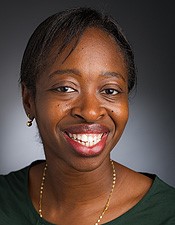Interview With 2014 ASH-AMFDP Award Recipient Esther Obeng, MD, PhD

Esther Obeng, MD, PhD, is a 2014 ASH-AMFDP Award recipient. She is a pediatric hematologist-oncologist at St. Jude Children’s Research Hospital in Memphis, Tennessee.
Can you provide a summary of your project and where you are in your research now?
I am studying how recurrent somatic mutations in components of the pre-mRNA splicing machinery contribute to the pathogenesis of myelodysplastic syndromes (MDS). Recurrent mutations in several components of the 3' pre-mRNA splicing machinery are the most common mutations identified in patients with MDS. My project involved generating human and murine models of the most common splicing factor mutation identified in MDS, SF3B1K700E, and studying how this mutation leads to features of MDS, aberrant mRNA splicing, and increased sensitivity to drugs that target the spliceosome. This work was recently published in Cancer Cell, and I am now studying how splicing factor mutations interact with other common mutations identified in patients with MDS. I am also working to identify novel therapeutic targets that can cooperate with spliceosome inhibition to selectively kill MDS stem cells.
How has receiving the ASH-AMFDP Award had an impact on your career?
Receiving the ASH-AMFDP Award was essential to the advancement of my career. The salary support afforded me time to develop several different models of SF3B1-mutant MDS in the laboratory. The support for reagents enabled me to hire a technician and pay for several studies essential for my project, including RNA sequencing and histopathological studies. The help of a technician enabled work on my project to continue while I was taking care of patients in the hospital. The ASH annual meetings exposed me to leaders in the field who were willing to share their experiences. The AMFDP annual meetings also exposed me to colleagues who could share their experiences regarding career advancement and who will also be future collaborators.
What is most rewarding to you about hematology? What is the most challenging?
There are many different causes for bone marrow failure/MDS. Identifying the cause of bone marrow failure in a patient is extremely rewarding as this helps us use present treatments most efficiently. There are still a large number of idiopathic causes of marrow failure and we are trying to use genomics to guide our understanding of the behavior of these cases. The biggest challenge is that stem cell transplantation, the only available curative therapy for bone marrow, has many associated complications including graft-versus-host disease. A better understanding of how mutations affect disease progression and identification of targeted therapies that may spare patients the morbidity and mortality associated with stem cell transplantation are the challenges I hope to address with my career in hematology.
What inspired you to go into hematology? Did you face any challenges along the way? If so, how did you overcome them?
The first patient I cared for as an intern had a bone marrow failure syndrome. As I learned about the different causes of bone marrow failure and the fact that the only curative treatment is presently stem cells transplantation, I developed an interest in this aspect of hematology and in identifying new treatments. Training at a large academic medical center that was affiliated with a strong hematology-oncology fellowship program enabled me to identify accomplished research mentors in my area of interest.
What was the best advice given to you by a mentor?
My research mentor has been an incredible resource. He encouraged me to work on my research project and to apply for the ASH-AMFDP Award. He has been a great resource for my career development. In each instance, he has given me great advice on the timing for when to pursue the next step.
Why should more underrepresented minorities choose careers in hematology? What would you say to these individuals who may be unsure of a career in the field?
More underrepresented minorities are needed in hematology because there are many different aspects of this field — sickle cell disease and other hemoglobinopathies, bone marrow failure syndromes, autoimmune cytopenias, thrombophilia — that affect individuals from all different backgrounds. The diversity of thought and experience offered by underrepresented minorities will contribute to the identification of novel therapies and lead to the enrollment of more hematology patients in clinical trials. I would suggest that anyone interested in hematology try to shadow a hematologist. The diverse patient populations and the need to gather more data and to develop new targeted treatments will be readily apparent and should help interested individuals identify a focused specialty area in the field.